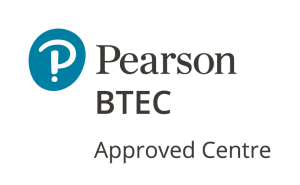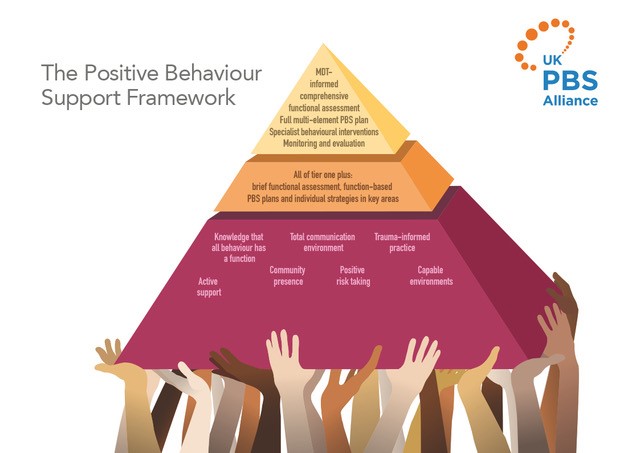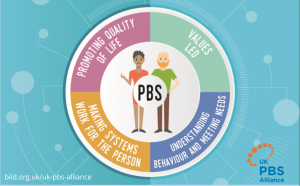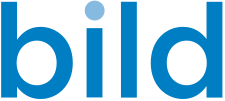BTEC Diploma Practice Leadership in Positive Behaviour Support

If you would like to apply, submit our online application form here.
Course dates
Spring 2025:
Applications close 4th April 2025.
Course starts 28th April 2025.
Autumn 2025:
Applications close 3rd October 2025.
Course starts 20th October 2025.
Fees
For individuals:
Bild member: £1,840 + VAT
Non-member: £2,100 + VAT
Find out about Bild Membership here
For cohorts (a group of six learners from the same organisation who go through the qualification together):
Bild member: £11,040 + VAT
Non-member: £12,600 + VAT
Find out about Bild Membership here>
This course is eligible for funding from the DHSC's Learning and Development Support Scheme (LDSS).
The time given to complete this course (5 units) is 18 months.

Qualification details
This practice-based qualification would be good for anyone who provides direct support and would like to be able to coach other people in Positive Behaviour Support (PBS).
On this programme, you will put your learning directly into practice, to improve the life of a person you support and make positive changes for them.
You will gain confidence in working to prevent crises from arising and will recognise behaviours of concern are more likely to happen when the environment does not work well for people.
You will learn how to do Active Support, complete a functional assessment, and implement a holistic support plan, as well as coach others to understand and implement all aspects of PBS.
There is a focus in this diploma on reducing restrictive practices and supporting human rights.

What is involved?
There are 350 learning hours in the Diploma, it carries 35 credits.
The time given to complete this course (5 units) is 18 months.
The learning hours are a mixture of online self-directed activities, most of which you can work through at your own pace, and at a time to suit you. The activities include webinars, films, reading, and interactive activities. There will also be practice-based activities (assessments, case studies), online group and individual tutorials, (discussion, reflection on new knowledge and skills and presenting work).
Pre course requirements
You must have level 2 English skills. Applicants must be working directly with users of their services, as having a 'focus person' for the entirety of the course is a mandatory requirement.
What will you learn?
There are five units that you must complete to gain the Diploma.
Understanding behaviours of concern and the role of positive behaviour support (5 credits)
This unit provides theory and knowledge to support understanding that behaviours often described as concerning are really responses to environments or experiences that are not working well for people. There is an emphasis on inclusive, evidence based and person centred practices which should underpin any response to behaviour that challenge. We are also reminded that improvements to quality of life are the first choice of intervention.
The unit will introduce you to all the components, values and theory that make up the PBS framework and the different levels of PBS at which PBS is applied. You will be able to relate these concepts directly to your own experiences and apply them to someone you support through the development of a case study.
By the end of the unit you will be able to explain to others and give real life examples of how PBS supports human rights and quality of life and wellbeing by making the environment work better for the person and reducing the risk of crisis being reached.
You will also be able to make informed recommendations to improve the quality of life of someone you support
Developing capable environments (6 credits)
This unit covers the development of capable environments for people who have behaviours that are seen as concerning or challenging by others. Capable environments are those environments in which people are able get their needs met, and in which they can thrive.
Capable environments focus directly on the areas of support that are associated with the reduction in occurrence of behaviours that are seen as concerning. Understanding and implementing a capable environment for each person is the first level in the PBS framework. It is an essential part of an approach that promises improvements in quality of life for both individuals and their carers, If PBS is used well the likelihood of specialist care and out-of-area placements being needed is reduced.
This unit covers communication and choice, rapport and relationships, sensory preferences, physical and emotional wellbeing, trauma informed support, low arousal practices, and active support.
Practice leadership, interactive coaching and active support (8 credits)
This unit covers the theory and practice of practice leadership - how to coach other to do a good job. This is very practical unit and will give you the skills to coach others. It also covers active support theory and practice in much more depth - how to meaningfully engage people so they can participate in their own lives.
Functional assessment and intervention (10 credits)
This unit gives you the skills and knowledge to carry out a holistic functional assessment. A good functional assessment has been described as an act of empathy- assisting us to understand what the problem is for the person – what they are trying to communicate through their behaviour.
- You will be coached through the process and complete an assessment for someone you support under supervision from the tutor
- You will have the opportunity to test out different methods of data collection and develop your observational skills
- You will be able to analyse the data you have collected and develop an effective intervention plan with a range of strategies
- You will learn how to monitor the success of the plan
- There is a focus on working with other professionals, improving quality of life, and understanding that past traumatic experiences may have a influence on peoples' wellbeing and levels of distress
Reducing restrictive practices (8 credits)
This unit focuses on the theory and practice and evidence base for the reduction of unnecessary restrictive practices. Such practices include physical restraint, medication, seclusion, mechanical restraints and blanket restrictions. The framework for this unit is the six core strategies for restraint reduction: leadership, workforce development, inclusion, post incident support and learning. It also covers specific reduction strategies like trauma informed support, low arousal approaches and sensory modulation. You will be introduced to a number of tools, complete a restraint reduction audit and develop an implementation plan.

